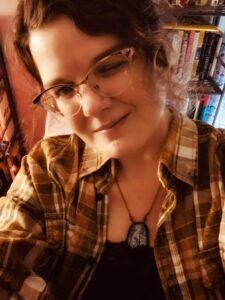My first discourse community is a writing group. We try to meet on a monthly basis with pieces of creative writing to share with each other. Our group does mainly fiction, but we’ve had people write nonfiction.
- Saying: There are terms all of us are familiar with (point of view, plot, characterization, tone, voice, dialogue) that we discuss when we read each others’ work. We learned this language from writing classes that we’ve taken in the past. Many of us (including me) have a Master’s of Fine Arts degrees in Creative Writing, but we’ve included writers without degrees.
- Doing: Besides meeting to discuss our work, we publish pieces in journals or magazines and hold readings at various venues (bookstores, coffeeshops, homes of writers). Before the pandemic, we met at coffee shops to talk about writing. Even though the pandemic has receded somewhat, we still usually meet via Zoom, since it means we don’t have to travel unless we all want to!
- Being: We are all writers, but we are other things in the “real world.” Creative writing doesn’t pay the bills, so all of us have day jobs that require our time and attention. Many of us are teachers, which means we don’t have the normal 9-5 work routine. I never have enough time to work on my writing–and I know my peers don’t, either.
- Valuing: We love to write. For me, it’s why I’m a teacher and a writer. I love talking about writing with students and my DC. I also love just doing the act of writing itself.
- Believing: We believe that all people have a story to tell, but we know it is difficult to get certain writers published and read by the larger population. We are or know writers of color, LGBTQ+ writers, economically disadvantaged writers, and disabled writers. The majority of published and well-known writers are white, male, cisgender, and abled writers. That is certainly changing–slowly–but it is a lot harder to break into the outside world if you aren’t those things. We want to see more publications by the groups listed above become the norm, rather than the outlier. We also want readers of all backgrounds to have access to books, short stories, nonfiction by people that look like them, so that the readers might think: Hey, I can be a writer, too!





Leave a Reply